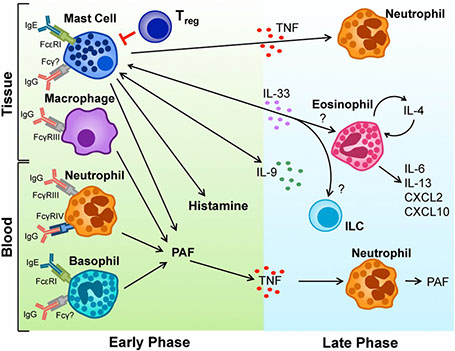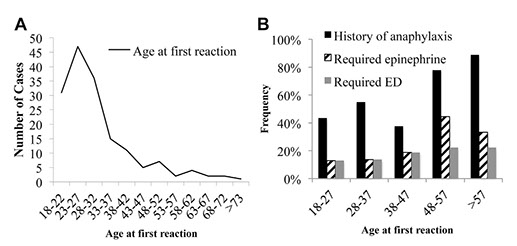The best food is in Chicago. There are great restaurants everywhere, from fancy places to burger joints.
The only thing I'm allergic to is criticism.
To raise new questions, new possibilities, to regard old problems from a new angle, requires creative imagination and marks real advance in science.
The most exciting phrase to hear in science, the one that heralds new discoveries, is not 'Eureka!' but 'That's funny ...
I've never seen a theater community to rival that of Chicago. Neither New York nor L.A. has the raw talent or integrity that Chicago theater has...
Researchers estimate that up to 15 million Americans have food allergies.
The Bryce Lab
Clinical Research
Our clinical research is focused on food allergy and food allergic diseases such as Eosinophilic Esophagitis. We combine epidemiology, patient samples and disease models to try and better understand why people are developing food allergy, what causes the reactions, and how we can develop new therapies for the treatment of patients.
Mechanistic Research
We study the biology of mast cells and basophils. These cells are important in allergy due to being able to bind the antibody IgE, which is commonly increased in allergy. Exposure to allergens triggers the release of many potent mediators from these cells, including histamine. We are interested in understanding how these cells develop, are activated, and how their products influence immune responses.
We are working at trying to understand how the immune system is controlled and how it goes wrong in disease.
When the immune system doesn't function correctly, it can lead to cancer, autoimmunity or, as we are particularly interested in, allergy.
Recent Publications
- Prevalence and characteristics of adult-onset food allergy.
- Allergic mechanisms in eosinophilic esophagitis.
Eosinophilic esophagitis is rapidly increasing in incidence. It is associated with food antigen-triggered, eosinophil-predominant inflammation, and the pathogenic mechanisms have many similarities to other chronic atopic diseases. Studies in animal models and from patients have suggested that allergic sensitization leads to food-specific IgE and T-helper lymphocyte type 2 cells, both of which seem to contribute to the pathogenesis along with basophils, mast cells, and antigen-presenting cells. In this review our current understandings of the allergic mechanisms that drive eosinophilic esophagitis are outlined, drawing from clinical and translational studies in humans as well as experimental animal models.

- The immunology of food allergy.
Food allergies represent an increasingly prevalent human health problem, and therapeutic options remain limited, with avoidance being mainstay, despite its adverse effects on quality of life. A better understanding of the key immunological mechanisms involved in such responses likely will be vital for development of new therapies. This review outlines the current understanding of how the immune system is thought to contribute to prevention or development of food allergies. Drawing from animal studies, as well as clinical data when available, the importance of oral tolerance in sustaining immunological nonresponsiveness to food Ags, our current understanding of why oral tolerance may fail and sensitization may occur, and the knowledge of pathways that may lead to anaphylaxis and food allergy-associated responses are addressed.

- Publication History
Seminars
Bryce Lab Meeting
Jan 30th-- CH (PP)/KC (PU)
Feb 13th—KCh (PP)/TV (PU)
Feb 27th—PJB (PP)/ LJ (PU)
March 13th-- JW (PP)/CH (PU)
March 27th—KC (PP)/ AMS (PU)
April 10th—TV (PP)/KCh (PU)
April 24th—LJ (PP)/PJB(PU)
May 8th—AAI Meeting
May 22nd-- CH (PP)/KC (PU)
June 5th-- KCh (PP)/TV (PU)
June 19th—JW (PP)/LJ (PU)
July 3rd—Holiday
July 17th—KC (PP)/AMS (PU)
July 31st—TV (PP)/ KCh (PU)
PP=Project Proposal
PU= Project Update
Allergy-Immunology Research Conference
Allergy-Immunology
Divisional Lab Meeting
Other Meetings



























